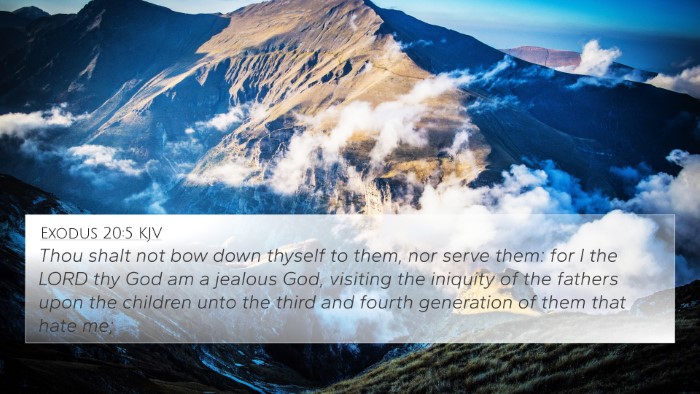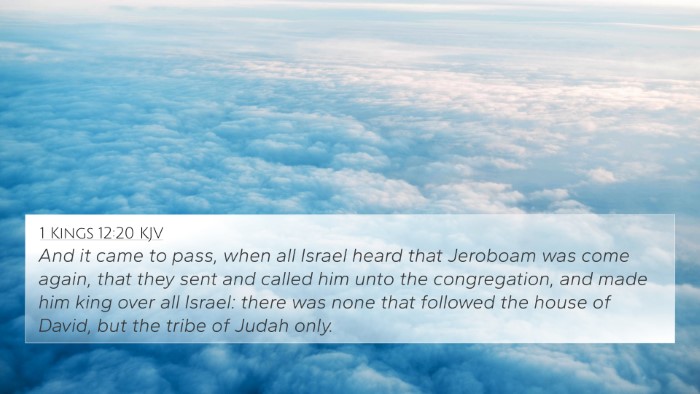Understanding 1 Kings 11:35
Bible Verse: "But I will take the kingdom out of his son's hand, and will give it unto thee, even ten tribes." - 1 Kings 11:35 (KJV)
This verse reveals a pivotal moment in the history of Israel during the reign of King Solomon. It marks the beginning of the division of the kingdom due to Solomon’s disobedience and the introduction of God’s judgment upon his lineage.
Context and Analysis
The context of this verse lies within God's pronouncement of judgment against Solomon for allowing idolatry to take root among the people through his foreign wives. The significance of this verse can be highlighted through various commentaries:
-
Matthew Henry's Commentary:
Henry emphasizes that God’s judgment is executed reflecting Solomon’s failures. The ten tribes being given to Jeroboam signifies a direct consequence of Solomon's turning away from God.
-
Albert Barnes' Notes:
Barnes interprets this passage as a strategic divine action, indicating that God is not only just but also sovereign, orchestrating the future of Israel according to His divine plan.
-
Adam Clarke's Commentary:
Clarke notes that this decision aligns with God's overarching mission of redemption and emphasizes the importance of faithfulness to God and the resulting blessings or curses derived from obedience or disobedience.
Thematic Connections
This verse establishes several important thematic connections and highlights the nature of God's communication with His people:
-
Divine Sovereignty: The noted transition of power shows God's ultimate authority over the affairs of nations.
-
Judgment and Mercy: God's judgment on Solomon contrasts with His promise to Jeroboam, showcasing both justice and grace.
-
Leadership Responsibility: This highlights the significant consequences leaders face regarding the moral and spiritual direction of their followers.
Cross-References
1 Kings 11:35 relates to numerous other Bible verses that illuminate its meaning. Here are some notable cross-references:
- 1 Kings 11:11-13: God's judgment pronounced against Solomon.
- 1 Kings 12:16-20: The reaction of the ten tribes as they choose Jeroboam.
- 2 Chronicles 10:1-19: The division of the kingdom and Jeroboam's ascension.
- Jeremiah 3:6-10: God's discussion of Israel’s faithlessness, relating back to the divisions.
- Matthew 1:12: A focus on the lineage continuing through those who were faithful, despite the division.
- Romans 11:1-6: Discussion regarding God's unchanging promise and the remnant of Israel.
- Ezekiel 37:15-22: Prophecy concerning the reunification of Israel.
Practical Application and Reflection
Studying this verse and its connections benefits the believer in several ways:
-
Understanding Accountability: Reflect on how leadership impacts collective faith and behavior among followers.
-
Embracing Divine Plans: Recognize that God's ways may not align with human understanding, prompting trust in His judgment.
-
Encouragement in Disobedience: Acknowledging the consequence of turning away from God serves as a warning and call to repentance.
Conclusion
1 Kings 11:35 provides an essential insight into the historical narrative of Israel and serves as a profound lesson on the nature of obedience to God. By exploring its connections to other verses, one can gain a deeper understanding of God’s character and His interaction with humanity. Through proper cross-referencing, believers are encouraged to seek out the relationships between these Biblical texts, enriching their study and enhancing their spiritual walk.







